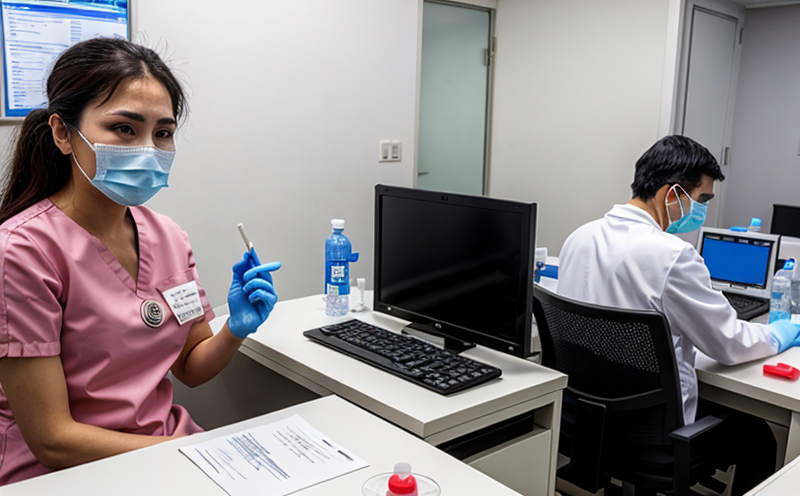Equine Influenza Virus Serology Testing in Horses
The Equine Influenza Virus (EIV) represents a significant threat to equine health and welfare, causing respiratory infections that can lead to economic losses for the horse industry. The primary objective of serology testing is to provide accurate diagnostics by measuring antibody levels against EIV antigens in serum or plasma samples from horses. This non-invasive test helps identify current or past exposure to the virus, thus providing valuable insights into the overall health status and immunity profile of a horse population.
The test procedure involves several critical steps: first, the collection of blood samples is crucial; these should be collected in EDTA tubes to prevent coagulation. The serum must then be separated promptly using appropriate techniques such as centrifugation at 4°C for optimal integrity and accuracy. Proper sample handling ensures reliable results by minimizing any potential interference from cellular debris or hemolysis.
The serological assay typically employs either the enzyme-linked immunosorbent assay (ELISA) method or the more traditional tube agglutination test (TAT). ELISAs are highly sensitive and specific, offering precise quantification of antibodies. TAT tests, on the other hand, provide a qualitative assessment indicating whether antibodies are present above a certain threshold. Both methods rely on capturing viral antigens immobilized onto microtiter plates or latex particles.
Interpretation of EIV serological test results is essential for understanding an individual horse’s immunity status. Positive tests suggest exposure to the virus, which may indicate active infection or previous vaccination. Negative results could imply either a lack of prior contact with the virus or insufficient time since initial exposure for antibodies to develop sufficiently.
Standardization and validation are paramount in ensuring consistent and reliable diagnostic outcomes across laboratories. Compliance with international standards like ISO 15189 is critical, as it guarantees high-quality testing practices. Additionally, participating in proficiency testing programs (PTPs) helps maintain accuracy and precision through continuous monitoring against established benchmarks.
Equine influenza can have severe implications for horses' respiratory systems, leading to coughing, nasal discharge, fever, and lethargy among other symptoms. Early detection via serology tests allows for timely intervention measures such as quarantining affected animals, administering supportive care, or implementing preventive vaccination protocols based on herd-specific needs.
Equine influenza is particularly concerning in large breeding farms where the potential spread of infection poses significant risks. Regular testing can help identify carriers before they become contagious, thereby protecting other susceptible horses within the facility and beyond through biosecurity measures.
In conclusion, EIV serology plays a pivotal role in managing equine influenza outbreaks by facilitating early diagnosis and informed decision-making regarding treatment plans or preventive strategies. Its importance lies not only in its diagnostic utility but also in its capacity to support long-term herd health management practices.
Eurolab Advantages
At Eurolab, we pride ourselves on delivering exceptional quality and reliability in all our services. For those seeking Equine Influenza Virus Serology Testing for their horses, here are some key advantages that set us apart:
- Advanced Instrumentation: Utilizing state-of-the-art equipment ensures accurate and consistent results.
- Experienced Technicians: Our team comprises highly skilled professionals with extensive experience in equine diagnostics.
- Comprehensive Reporting: Detailed reports are provided alongside every test result, including actionable insights for herd health management.
- Accreditation: Eurolab is ISO 15189 accredited, ensuring adherence to rigorous quality standards.
- Proficiency Testing Participation: Regularly participating in PTPs guarantees ongoing performance assessment and improvement.
- Clinical Relevance: Our tests are designed specifically for the equine population, reflecting real-world clinical scenarios.
- Comprehensive Support: Eurolab offers not only testing but also consultative services to help clients make informed decisions regarding their horse’s health care.
We take pride in providing a service that exceeds expectations by combining cutting-edge technology with compassionate care for the horses under our scrutiny. Choose Eurolab for peace of mind and reliable results, ensuring your equine companions receive the best possible care.
Why Choose This Test
Equine Influenza Virus Serology Testing offers several compelling reasons why it should be a preferred choice for horse owners and veterinary clinics:
- Precision Diagnosis: The test provides precise information about the presence of EIV antibodies, helping to diagnose current or past infections accurately.
- Non-Invasive: Unlike other diagnostic methods, this test does not require invasive procedures such as bronchoscopy or endoscopy, making it less stressful for horses.
- Cost-Effective: When compared with more expensive treatments and potential losses from outbreaks, the cost of serology testing is relatively low.
- Safety: The test poses minimal risk to both the horse and personnel involved in sample collection and handling.
- Rapid Turnaround Time <|im_start|> yansız





